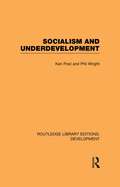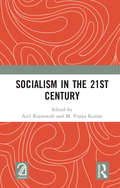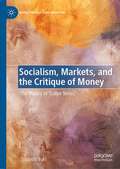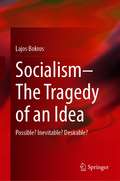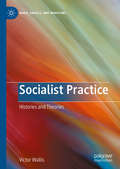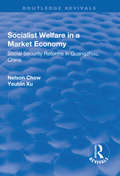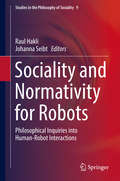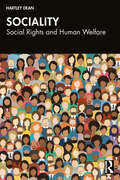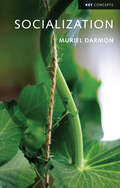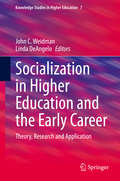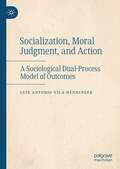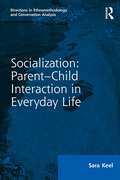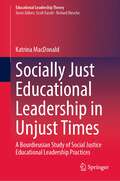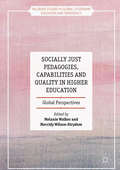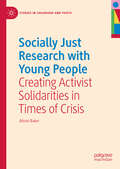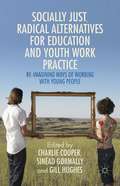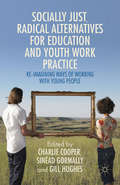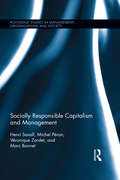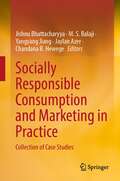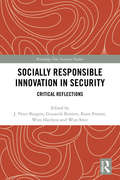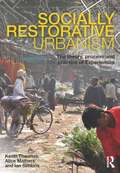- Table View
- List View
Socialism and Underdevelopment (Routledge Library Editions: Development)
by Ken Post Philip WrightIn this book, first published in 1989, Ken Post and Phil Wright provide a critical analysis of socialist construction in underdeveloped countries. Pointing out that all the socialist revolutions of the twentieth century have occurred in underdeveloped peripheral capitalist countries, they focus on the relationship between socialism and underdevelopment. They bring together the insights of both development theory and the political economy of socialism, and draw upon their direct experience of the state socialist societies as diverse as North Korea, Yugoslavia, Vietnam, and the Soviet Union.
Socialism in Marx’s Capital: Towards a Dealienated World (Marx, Engels, and Marxisms)
by Paresh ChattopadhyayThis book explores how Marx envisaged society after capital(ism) by a close examination of the idea of socialism in the text(s) of Capital. Going beyond Marx’s critique of the Gotha Programme, Paresh Chattopadhyay challenges those who leave Capital aside in discussions of socialism in Marx’s works on the grounds that it is uniquely preoccupied with the critical analysis of capitalism. Instead, Chattopadhyay shows how Marx, in Capital, considered capitalism as a simple transitional society preparing the advent of socialism envisioned as an association of free and equal individuals.
Socialism in the 21st Century
by Anil Rajimwale; M. Vijaya KumarThe present collection contains papers of the first national workshop organised by the All India Progressive Forum (AIPF) on '21st Century Socialism' in Hyderabad. Socialism is a controversial issue, rendered more controversial by the great collapse of the Soviet Union and the East European socialist regimes. The collapse has reignited the controversies on the nature, path and viability of socialism in its many interpretations. In the meantime the scientific and technological revolution has added new features to the theory of social transformation, and has reopened many issues settled by history of individual revolution. The papers discuss many old and new aspects of socialism, social revolution and transformation. They also seek to add many new features. They particularly emphasize the notion that socialism of '21st century' will be different, in many crucial ways, than that of the 20th century.Please note: This title is co-published with Aakar Books, New Delhi. Taylor & Francis does not sell or distribute the Hardback in India, Pakistan, Nepal, Bhutan, Bangladesh, Maldives and Sri Lanka.
Socialism the Active Utopia: The Active Utopia (Routledge Revivals #No. 3)
by Zygmunt BaumanRather than contributing to the long-standing discussion about the characteristics of the society that socialism proposes to establish, this Routledge Revival, initially published in 1976, aims to explore the impact of the ‘living utopia’ of socialism on the development of modern society. It begins with an analysis of the role of utopia in general, and of the socialist utopia in particular; Bauman considers the opposition between ‘utopian’ and ‘scientific’ social thought; He presents socialism as the ‘counter-culture’ of capitalist society; The book finally examines the reasons for the failure of socialism in its application to the peasant revolution in Russia. It then explores some possible forms that the socialist utopia might take in the industrial societies of the late twentieth century. Professor Bauman writes for those who want to understand the logic of the historical fate of socialism in the present century, who are concerned about the validity and vitality of socialist ideas on the development of modern society, and who are interested, and perhaps confused, by the cultural and ideological conflicts of the last few decades.
Socialism with a Human Face: Using Behavioural Economics to Understand East German Economic History (Palgrave Studies in Economic History)
by Wayne Geerling Gary B. MageeEast Germany’s economic history is typically told as a story of the unravelling of an inherently flawed system. Yet, while the system’s inefficiency is undeniable, its economic history was much richer than its comparatively poor economic performance suggests. For many who lived there, it was a system that, over its forty years, was capable of achievements and generally functioned at bearable levels. This book combines the insights of behavioural economics with archival research to peel away layers of rhetoric and assumptions about the East German economy and explore aspects of that underlying functionality. Through a series of cases studies that examine the establishment of socialist workplaces, the searches for productivity growth and efficiency, and the emergence of financial crisis, the book considers the system from the perspective of the humans who operated it and made the decisions that made it work. Unencumbered by political preconceptions, it offers a more realistic understanding of East German economic history than that derived from stagnant debates about the clash of systems. The new perspectives and approaches presented demonstrate that, extracted from its Cold War context, East Germany’s economic history can be analysed for what it was, rather than for what it symbolised.
Socialism, Markets, and the Critique of Money: The Theory of “Labor Notes” (Marx, Engels, and Marxisms)
by Tsuyoshi YukiThis book provides a comprehensive overview of historical and international debates on the theory of “labor money” or “labor notes.” These debates exist in a triangular context of market socialism, communism (community-based socialism), and local currency, joining numerous socialists, anarchists, and Marx and Engels. Labor note theory encompasses theoretical, ideological, and practical doctrines aimed at designing a fair and desirable labor-based market or non-market economy by reforming the monetary and credit system. This theory was considered an unfeasible utopian idea in the context of orthodox Marxism, which is typically based on a historical study of surplus value doctrines. However, this book eschews Marx’s critique of “labor money” that limits the debate regarding a concrete alternative society, and instead proposes practical and gradual approaches to social reform by scrutinizing the primary sources of labor money theories and practical experiences and reconstructs their theoretical relationships.
Socialism—The Tragedy of an Idea: Possible? Inevitable? Desirable?
by Lajos BokrosThis book explores the idea of socialism from three angles and raises the questions if socialism is possible, inevitable, and desirable. Socialism as an economic and societal system was possible based on the two most important pillars of Marxian political economy: State ownership in the means of production and mandatory central planning (command economy). Nevertheless, these two characteristics are compatible only with dictatorship. On this basis, socialism is neither inevitable nor desirable, because it excludes competition, freedom, democracy, and the rule of law.The three questions are analyzed through the academic work of five towering figures: Joseph A. Schumpeter, Karl Polanyi, Friedrich A. Hayek, Karl Popper, and Hannah Arendt. The theoretical findings and inferences resulting from this analysis are compared with the reality of socialism as it existed rather than an imaginary uncontroversial blueprint of socialism.The book discusses the evolution of Soviet communism and its attempts with market reforms to solve its inherent contradictions. It concludes that totalitarian regimes tend to fail in reforms because market freedom is inconsistent with totalitarian control. The author makes a strong case against dictatorship, also in the context of the spreading of nationalist populism around the globe. This book is a must-read for everybody interested in a better understanding of the ideas of socialism, totalitarianism, and populism.
Socialist Practice: Histories and Theories (Marx, Engels, and Marxisms)
by Victor WallisThe level of popular discontent—in the United States as elsewhere—has shown a dramatic increase in recent years, but has yet to crystallize into a cohesive anti-capitalist political force. Socialist Practice aims to contribute to a popular movement for socialism. It does so by 1) revisiting, under present conditions, longstanding questions of Marxist theory and revolutionary history, and 2) illustrating the range of issues, activities, and forms of expression that can both inform and be informed by a Marxist approach. Essays spanning a range of national experiences address the crying need to generate a society-wide awakening, grounded in purposeful discussion among all those (the vast majority) whose interests are ill-served by continuation of the status quo.
Socialist Welfare in a Market Economy: Social Security Reforms in Guangzhou, China
by Yongxin Zhou Nelson Chow Yeubin XuThis title was first published in 2001. Using the city of Guangzhou as a case study, this text looks at how China has adopted a market economy, whilst still maintaining state-owned enterprises and an all-embracing social security system which protects the majority of Chinese workers. This volume examines three questions: can socialist social welfare co-exist with the market economy?; can state-owned enterprises survive in a market economy?; and has China succeeded in creating a market economy without sacrificing its socialist ideals? The study demonstrates that compromises have been necessary to accomodate both socialist and market objectives. continuing to support workers with social security benefits has, for example, made enterprises less competitive, and disparities in benefits arise as workers are allowed to supplement the minimum guaranteed income through savings in individual accounts.
Sociality and Normativity for Robots
by Johanna Seibt Raul HakliThis volume offers eleven philosophical investigations into our future relations with social robots--robots that are specially designed to engage and connect with human beings. The contributors present cutting edge research that examines whether, and on which terms, robots can become members of human societies. Can our relations to robots be said to be "social"? Can robots enter into normative relationships with human beings? How will human social relations change when we interact with robots at work and at home? The authors of this volume explore these questions from the perspective of philosophy, cognitive science, psychology, and robotics. The first three chapters offer a taxonomy for the classification of simulated social interactions, investigate whether human social interactions with robots can be genuine, and discuss the significance of social relations for the formation of human individuality. Subsequent chapters clarify whether robots could be said to actually follow social norms, whether they could live up to the social meaning of care in caregiving professions, and how we will need to program robots so that they can negotiate the conventions of human social space and collaborate with humans. Can we perform joint actions with robots, where both sides need to honour commitments, and how will such new commitments and practices change our regional cultures? The authors connect research in social robotics and empirical studies in Human-Robot Interaction to recent debates in social ontology, social cognition, as well as ethics and philosophy of technology. The book is a response to the challenge that social robotics presents for our traditional conceptions of social interaction, which presuppose such essential capacities as consciousness, intentionality, agency, and normative understanding. The authors develop insightful answers along new interdisciplinary pathways in "robophilosophy," a new research area that will help us to shape the "robot revolution," the distinctive technological change of the beginning 21st century.
Sociality: Social Rights and Human Welfare
by Hartley DeanThis book develops a very particular concept of sociality: a holistic way of understanding how human beings have come to care about and collectively provide for their welfare as a species and to recognise each other’s needs in terms of shared social rights. It tells not so much a success story as a hopeful story. It provides a new way of looking at how our rights to life’s essentials have been in the past, are now and can in the future be understood. It is, potentially, a book for anyone interested in the human condition but will be especially interesting for those engaged in human service provision, community action, social development, welfare law and political debate, and particularly useful to students of social policy and human rights.It is a radically revised edition of Social Rights and Human Welfare, first published in 2015. It provides modified, re-organised and updated versions of chapters from that book while offering a wholly new underlying narrative through which further to develop and apply the author’s alternative theory of social rights. It is a book about the connections between social rights and human welfare; between theory and practice; between debate and reality in the spheres of human service provision and human livelihoods.
Socialization (Key Concepts)
by Muriel DarmonHow does society form and transform individuals? Sociology has been asking this question since its inception and “socialization” has been analyzed from different vantage points by various prominent thinkers. Socialization offers an overview of some of these perspectives in the classic work of key theorists and in contemporary research that has either developed or challenged these ideas. The book argues that, while socialization has sometimes been framed as an outdated, static approach, it in fact remains highly relevant and continues to provide valuable insight into how we come to act and think as we do. Drawing on a wide variety of empirical examples, the book offers a lively, accessible account of primary and secondary socialization, and how they interconnect. By considering socialization as a process that continues throughout the life course, the book highlights the dynamic and enduring ways in which the social world is involved in shaping and reshaping individuals, shedding productive light on the effects of class, gender, and race, as well as on inequality and domination. Socialization will appeal to students and scholars in sociology, as well as other disciplines such as psychology and education.
Socialization in Higher Education and the Early Career: Theory, Research and Application (Knowledge Studies in Higher Education #7)
by John C. Weidman Linda DeAngeloThis book celebrates the contributions of John Weidman and his colleagues to the understanding of student socialization in higher education. It includes innovative chapters reflecting new approaches to higher education student socialization with respect to students of color, gender, STEM, and students in higher education systems outside the USA. Specifically, the book examines socialization between and within in a range of groups, including national, international and minority students, parents, doctoral students, early career faculty, and scholarly practitioners. The book assesses methodological approaches and suggests directions for reformulating theory and practice. Using sociological perspectives to address issues and concerns at both the undergraduate and graduate levels, the book gives renewed life to the college impact literature. It includes revisions and expansions of the original Weidman frameworks based on the synthesis of existing research with new work reflecting unique perspectives by a variety of authors. John Weidman has been an indisputable force in the study and understanding of student socialization in higher education. This new book by Weidman and his coeditor, Linda DeAngelo, represents an undeniably significant and welcomed expansion of the original “Weidman model” of student socialization. In updating and revising the original model, chapter authors give attention to various contemporary issues such as student diversity, gender differences, early career experiences, and internationalism. Whether one samples only some of the articles that constitute this book or reads all of them, the professional payoff will be substantial. Kenneth A. Feldman, Professor of Sociology, Stony Brook University John Weidman has made a number of groundbreaking contributions to our understanding of student socialization in postsecondary education. This book, edited with Linda DeAngelo, brings together a group of fine scholars whose contributions will push our understanding even further. It is a significant addition to the college impact literature. Ernest T. Pascarella, Petersen Chair in Higher Education, University of Iowa
Socialization, Moral Judgment, and Action: A Sociological Dual-Process Model of Outcomes
by Luis Antonio Vila-HenningerHow does culture affect action? This question has long been framed in terms of a means vs ends debate—in other words, do cultural ends or cultural means play a primary causal role in human behavior? However, the role of socialization has been largely overlooked in this debate. In this book, Vila-Henninger develops a model of how culture affects action called “The Sociological Dual-Process Model of Outcomes” that incorporates socialization. This book contributes to the debate by first providing a critical overview of the literature that explains the limitations of the sociological dual-process model and subsequent scholarship—and especially work in sociology on “schemas”. It then develops a sociological dual-process model of moral judgment that formally explains Type I processes, Type II processes, and the interaction between Type I and Type II processes. The book also expands sociological dual-process models to include a temporal dimension—the "Sociological Dual-Process Model of Outcomes". Finally, the book integrates a theory of socialization into the sociological dual-process model and creates empirical indicators that confirm Vila-Henninger’s theorization and contribute to the literature on measures of dual-process models.
Socialization: Parent-child Interaction In Everyday Life (Directions in Ethnomethodology and Conversation Analysis)
by Sara KeelAdopting a conversation analytic approach informed by ethnomethodology, this book examines the process of socialization as it takes place within everyday parent–child interactions. Based on a large audio-visual corpus featuring footage of families filmed extensively in their homes, the author focuses on the initiation of interactive assessment sequences on the part of young children with their parents and the manner in which, by means of embodied resources, such as talk, gaze, and gesture, they acquire communicative skills and a sense of themselves as effective social actors. With attention to the responses of parents and their understanding of their children's participation in exchanges, and the implications of these for children's communication this book sheds new light on the ways in which parents and children achieve shared understanding, how they deal with matters of 'alignment' or 'disalignment' and issues related to their respective membership categories. As a rigorous and detailed study of children's early socialization as well as the structural and embodied organization of communicative sequences, Socialization: Parent–Child Interaction in Everyday Life will appeal to scholars of sociology and child development with interests in ethnomethodology and conversation analysis, early years socialization and the sociology of family life.
Socially Just Educational Leadership in Unjust Times: A Bourdieusian Study of Social Justice Educational Leadership Practices (Educational Leadership Theory)
by Katrina MacDonaldThis book offers a richly observed study of three principals working in some of the most disadvantaged primary schools in Victoria, Australia. It explores their social justice understandings and practices in working to improve the educational outcomes for children in their schools, through autobiography, biographical interviews, in-depth interviews and observations. The work looks into their life histories, the formation of their primary and secondary habitus, and uncovers and examines their encounters with the public education field. Drawing on Pierre Bourdieu’s theory of practice and his ‘thinking tools’, the book investigates how the principals’ understandings of social justice are shaped by the intersection of their life and work histories. This book is of interest to educational leadership scholars interested in the application of critical theory to studies of leadership. The book provides an exemplar for the application of Bourdieu’s theory of practice, and it makes a strong contribution to Bourdieusian scholarship, social justice scholarship and educational leadership scholarship.
Socially Just Pedagogies, Capabilities and Quality in Higher Education
by Melanie Walker Merridy Wilson-StrydomThis book explores the idea that teaching and learning - pedagogy - at universities is a crucial space for students' formation as ethical graduates, equipped with knowledge, skills and values to contribute to more equal societies. We know that universities across the globe do not stand apart from social and educational inequalities at multiple levels; they have the potential to reproduce or reduce social inequalities and therefore towards transformative ends. This book suggests how this could be achieved both via policy and practice around the globe
Socially Just Research with Young People: Creating Activist Solidarities in Times of Crisis (Studies in Childhood and Youth)
by Alison BakerThis book bridges the fields of critical youth studies, community psychology, and sociology to offer a transdisciplinary analysis of youth voice, participation, and activism, as well as of creative and inclusive knowledge-making practices. Presented in three parts, the book traces our journey of praxis as we documented the narratives and testimonies of young people and then mobilised this knowledge to co-imagine and co-create a Youth Participatory Action Research (YPAR) collective aimed at fostering connection and healing during the stringent lockdowns of 2020 in Victoria, Australia. Community building and art-making became central to memorialising their experiences of grief and loss, whilst also opening up new ways of seeing, being and doing. With no end in sight to our current coalescence of crises, this book serves as an invitation to those working alongside young people to consider what we must carry with us if we are to reimagine and remake our world.
Socially Just, Radical Alternatives for Education and Youth Work Practice: Re-Imagining Ways of Working with Young People
by Charlie Cooper Sinéad Gormally Gill HughesChallenging dominant discourses in neoliberal marketized societies about working with disconnected young people, this book argues that alternative, radical approaches to formal and informal education are necessary to challenge repressive practices, and to help build a more equal, socially-just society.
Socially Just, Radical Alternatives for Education and Youth Work Practice: Re-Imagining Ways of Working with Young People
by Charlie Cooper Gill Hughes Sin�ad GormallyChallenging dominant discourses in neoliberal marketized societies about working with disconnected young people, this book argues that alternative, radical approaches to formal and informal education are necessary to challenge repressive practices, and to help build a more equal, socially-just society.
Socially Responsible Capitalism and Management (Routledge Studies in Management, Organizations and Society)
by Marc Bonnet Henri Savall Michel Péron Véronique ZardetIn the current crisis context, capitalism is questioned by its detractors or defended by its partisans. The concept of Socially Responsible Capitalism (SRC) is based on the entrepreneurial spirit. It encourages exemplary behaviors, such as effective, efficient and ethical behaviors, by stimulating social responsibility of companies and organizations. This is combined with the development of economic empowerment and legitimate efforts of each citizen-actor. Socially Responsible Capitalism and Management does not confuse financial capitalism and entrepreneurial capitalism. The first one improves the creation of artificial value which leads to financial bubbles that periodically burst and bankrupt the real economy. Quite the reverse, entrepreneurial capitalism creates both solid economic value and employment. This is justified by the production of goods and services that meet legitimate needs of consumer-citizens. This book shows that by putting Human Beings at the heart of action enables producing sustainable economic value, and anthropological values which are inseparable. The innovative aspect of this book lies in its analysis starting from the macro-economic level to the individual one, by presenting a detailed analysis of the micro-economic level of companies within its managerial issues. Socially Responsible Capitalism and Management is dedicated to present the different aspects of SRC for the Society, companies and organizations and also individual actors, as citizens, producers and consumers.
Socially Responsible Consumption and Marketing in Practice: Collection of Case Studies
by Jishnu Bhattacharyya M. S. Balaji Yangyang Jiang Jaylan Azer Chandana R. HewegeThe book provides an overview of socially responsible consumption and marketing, as well as a collection of teaching cases that discuss and emphasize how 21st-century organizations, both for-profit and non-profit, are addressing socially responsible consumers and meeting their changing needs while remaining profitable. Consumers, governments, academics, and practitioners are becoming more interested in promoting positive social changes through consumption. As a result, this book aims to understand the practice of marketing in bringing about positive social change through real-life case studies. Consumption by socially responsible consumers who care about the social good is unique, not only because of its inter-disciplinary and substantive subject matter but also because it presents challenges and pushes organizations to make significant changes in the ways they have been accomplishing organizational activities in the twenty-first century, from procurement to production to sales and services. The book goes beyond individual consumers and their lifestyles to promote the scope of discussing marketing strategies. It seeks to comprehend how people consume and how socially responsible consumption is conceived. The case studies present and pursue integrated solutions for more sustainable consumption. This is a must-read for marketers who want to reach out to socially responsible consumers.
Socially Responsible Innovation in Security: Critical Reflections (Routledge New Security Studies)
by Genserik Reniers Koen Ponnet J. Peter Burgess Wim Hardyns Wim SmitThis book examines the possibility of socially responsible innovation in security, using an interdisciplinary approach. Responsible innovation in security refers to a comprehensive approach that aims to integrate knowledge related to stakeholders operating at both the demand and the supply side of security – technologists, citizens, policymakers and ethicists. Security innovations can only be successful in the long term if all the social, ethical and ecological impacts, and threats and opportunities, both short term and long term, are assessed and prioritized alongside technical and commercial impacts. The first part of this volume focuses on security technology innovation and its perception and acceptance by the public, while the second part delves deeper into the processes of decision-making and democratic control, raising questions about the ethical implications of security ruling. This book will be of much interest to students of critical security studies, sociology, technology studies and IR in general.
Socially Restorative Urbanism: The theory, process and practice of Experiemics
by Kevin Thwaites Alice Mathers Ian SimkinsThe need for a human-orientated approach to urbanism is well understood, and yet all too often this dimension remains lacking in urban design. In this book the authors argue for and develop socially restorative urbanism – a new conceptual framework laying the foundations for innovative ways of thinking about the relationship between the urban spatial structure and social processes to re-introduce a more explicit people-centred element into urban place-making and its adaptation. Focusing on this interplay between humans and the built environment, two new concepts are developed: the transitional edge – a socio-spatial concept of the urban realm; and Experiemics – a participative process that acts to redress imbalances in territorial relationships, defined in terms of the awareness of mine, theirs, ours and yours (MTOY). In this way, Socially Restorative Urbanism shows how professional practice and community understanding can be brought together in a mutually interdependent and practical way. Its theoretical and practical principles are applicable across a wide range of contexts concerning human benefit through urban environmental change and experience, and it will be of interest to readers in the social sciences and environmental psychology, as well as the spatial planning and design disciplines.
Socially Strong, Emotionally Secure: 50 Activities to Promote Resilience in Young Children
by Karen Cairone Nefertiti BruceNow more than ever, adults must help children develop the skills necessary to navigate through life successfully. By focusing on building social and emotional strength, we increase children’s resilience and prepare them to handle the challenges in life. The strategies and activities in Socially Strong, Emotionally Secure help children become socially and emotionally healthy for life. Organized into five chapters, the activities support and build resilience in children ages 3 to 8.
